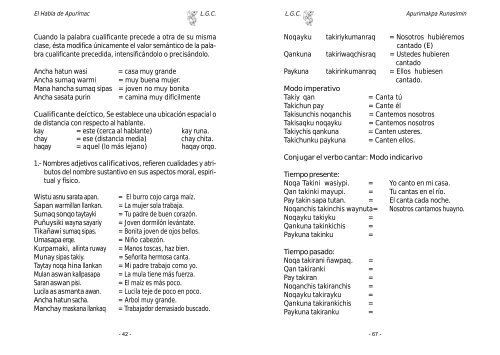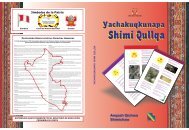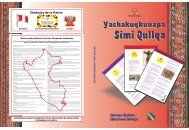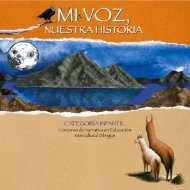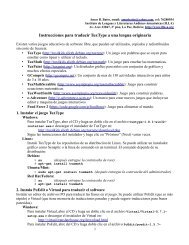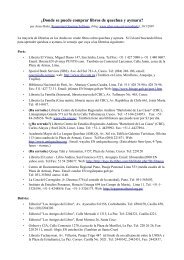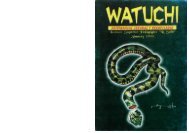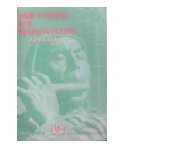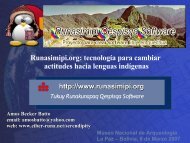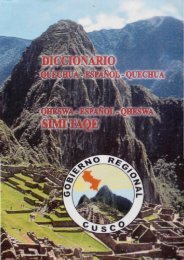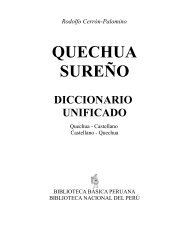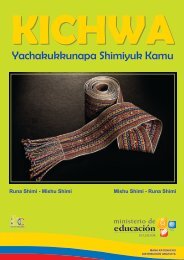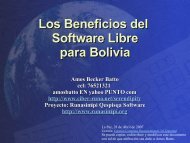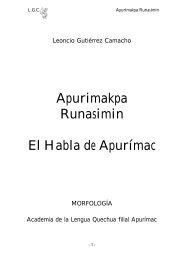PDF-Imprimir - ILLA
PDF-Imprimir - ILLA
PDF-Imprimir - ILLA
- No tags were found...
You also want an ePaper? Increase the reach of your titles
YUMPU automatically turns print PDFs into web optimized ePapers that Google loves.
El Habla de Apurímac<br />
L.G.C.<br />
L.G.C.<br />
Apurimakpa Runasimin<br />
Cuando la palabra cualificante precede a otra de su misma<br />
clase, ésta modifica únicamente el valor semántico de la palabra<br />
cualificante precedida, intensificándolo o precisándolo.<br />
Ancha hatun wasi<br />
Ancha sumaq warmi<br />
Mana hancha sumaq sipas<br />
Ancha sasata purin<br />
= casa muy grande<br />
= muy buena mujer.<br />
= joven no muy bonita<br />
= camina muy difícilmente<br />
Cualificante deíctico, Se establece una ubicación espacial o<br />
de distancia con respecto al hablante.<br />
kay = este (cerca al hablante) kay runa.<br />
chay = ese (distancia media) chay chita.<br />
haqay = aquel (lo más lejano) haqay orqo.<br />
1.- Nombres adjetivos calificativos, refieren cualidades y atributos<br />
del nombre sustantivo en sus aspectos moral, espiritual<br />
y físico.<br />
Wistu asnu sarata apan.<br />
Sapan warmillan llankan.<br />
Sumaq sonqo taytayki<br />
Puñuysiki wayna sayariy<br />
Tikañawi sumaq sipas.<br />
Umasapa erqe.<br />
Kurpamaki, allinta ruway<br />
Munay sipas takiy.<br />
Taytay noqa hina llankan<br />
Mulan aswan kallpasapa<br />
Saran aswan pisi.<br />
Lucila as asmanta awan.<br />
Ancha hatun sacha.<br />
Manchay maskana llankaq<br />
= El burro cojo carga maíz.<br />
= La mujer sola trabaja.<br />
= Tu padre de buen corazón.<br />
= Joven dormilón levántate.<br />
= Bonita joven de ojos bellos.<br />
= Niño cabezón.<br />
= Manos toscas, haz bien.<br />
= Señorita hermosa canta.<br />
= Mi padre trabajo como yo.<br />
= La mula tiene más fuerza.<br />
= El maíz es más poco.<br />
= Lucila teje de poco en poco.<br />
= Arbol muy grande.<br />
= Trabajador demasiado buscado.<br />
Noqayku takiriykumanraq = Nosotros hubiéremos<br />
cantado (E)<br />
Qankuna takiriwaqchisraq = Ustedes hubieren<br />
cantado<br />
Paykuna takirinkumanraq = Ellos hubiesen<br />
cantado.<br />
Modo imperativo<br />
Takiy qan<br />
= Canta tú<br />
Takichun pay<br />
= Cante él<br />
Takisunchis noqanchis = Cantemos nosotros<br />
Takisaqku noqayku = Cantemos nosotros<br />
Takiychis qankuna = Canten usteres.<br />
Takichunku paykuna = Canten ellos.<br />
Conjugar el verbo cantar: Modo indicarivo<br />
Tiempo presente:<br />
Noqa Takini wasiypi. = Yo canto en mi casa.<br />
Qan takinki mayupi. = Tu cantas en el río.<br />
Pay takin sapa tutan. = El canta cada noche.<br />
Noqanchis takinchis waynuta= Nosotros cantamos huayno.<br />
Noqayku takiyku =<br />
Qankuna takinkichis =<br />
Paykuna takinku =<br />
Tiempo pasado:<br />
Noqa takirani ñawpaq. =<br />
Qan takiranki =<br />
Pay takiran =<br />
Noqanchis takiranchis =<br />
Noqayku takirayku =<br />
Qankuna takirankichis =<br />
Paykuna takiranku =<br />
- 42 -<br />
- 67 -


